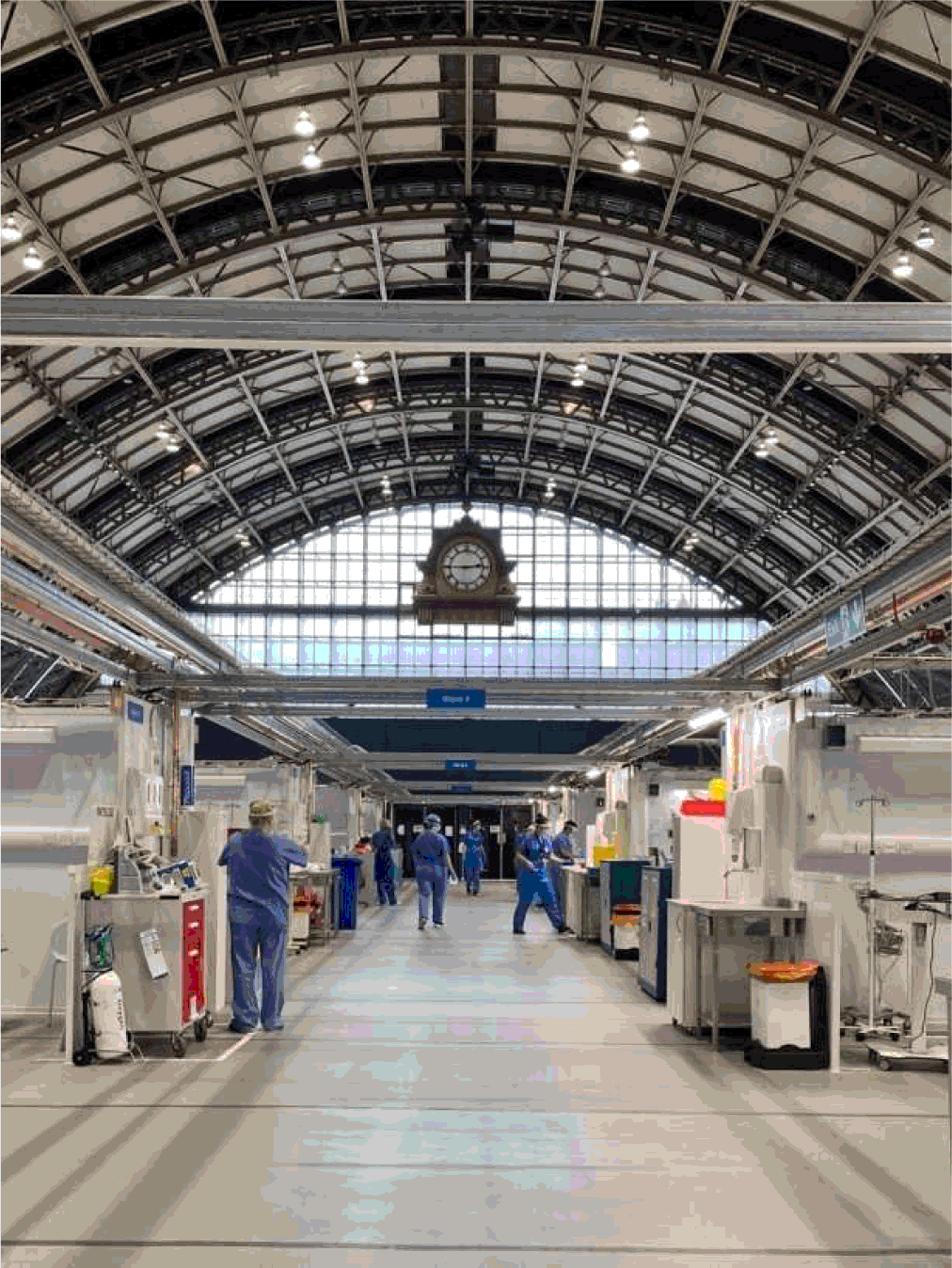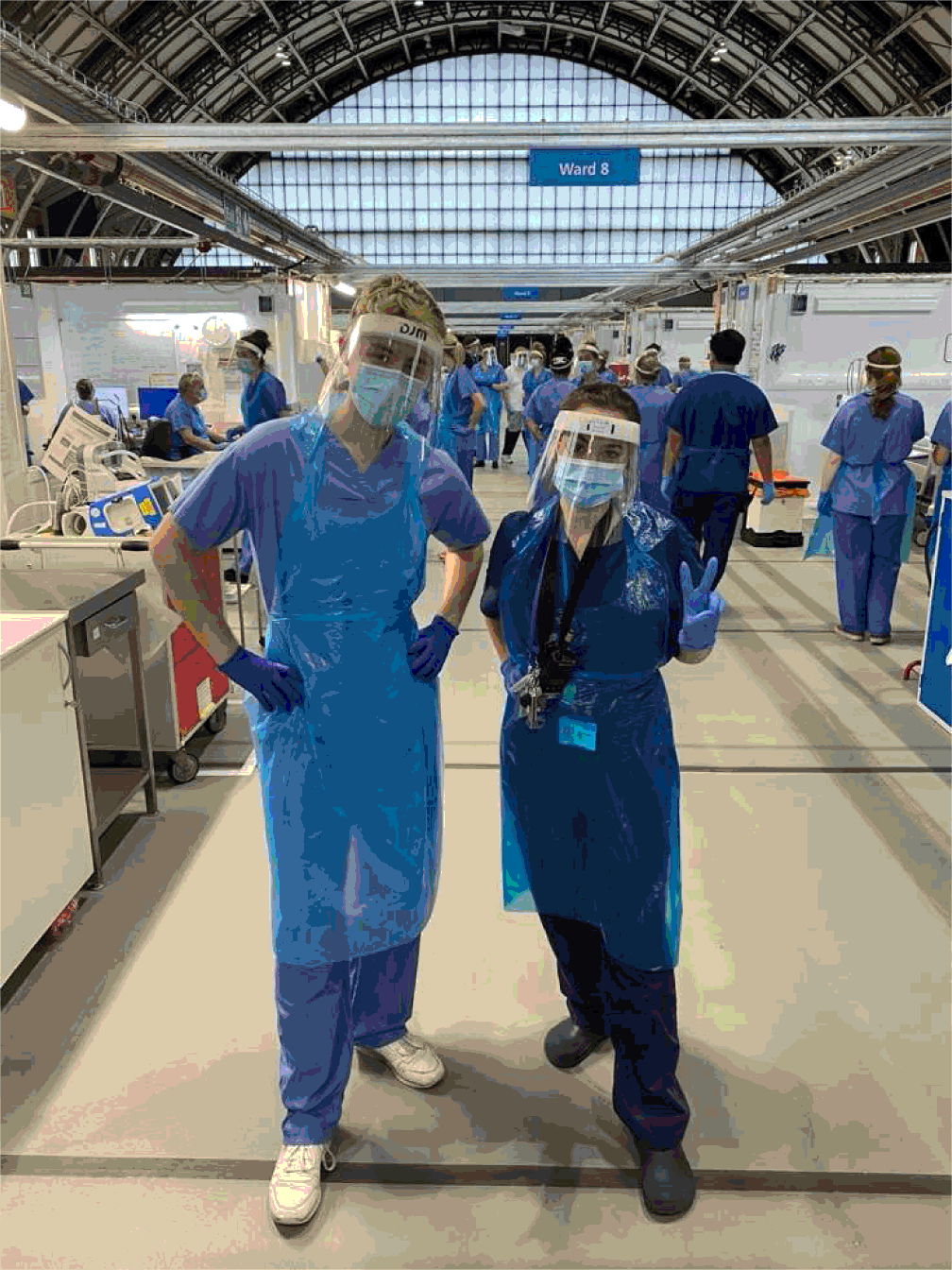The towering ceilings reminding us of the hospital's past as a train station. The large clock remained illuminated throughout the night shifts and was quite a sight.

Lewis Holt1
doi: http://dx.doi.org/10.5195/ijms.2020.640
Volume 8, Number 2: 180-182
Received 01 07 2020: Rev-request 02 07 2020: Rev-recd 02 07 2020: Accepted 02 07 2020
“I never lose an opportunity of urging a practical beginning however small for it is wonderful how often in such matters the mustard seed germinates and roots itself” – Florence Nightingale;1 fitting words for my strange current circumstances. I have been working on the frontline against COVID-19 at a National Health Service (NHS) COVID-19 field hospital, in the North West of the United Kingdom (UK), in the midst of a pandemic that has shaken the globe. Deployed as a healthcare assistant, I found myself learning more along the way than I could have imagined.
Life as a British medical student changed dramatically within the space of a fortnight in light of the COVID-19 crisis. The World Health Organization (WHO) officially declared the pandemic on the 12th of March 2020 and by the 13th of March universities, placements, and exams across the UK had been suspended indefinitely.2. Within a week, all students were granted automatic progression and I moved into fourth year. All teaching was moved online and learning updates were provided via regular videoconferences. I found myself with an idle mind, lots of free time, and no way to spend it under a national lockdown. I was keen to maintain some form of clinical work, as a leave absence from patient contact is not ideal for any healthcare student, but was met with resistance from my family. They feared for my health and reiterated chilling scenes seen on the news from high dependency COVID-19 wards across the world, worrying that this was what I was heading to face. It also meant moving away to live in a hotel with my colleagues, as to not risk bringing COVID-19 home and risking the health of my family. It was a very fast paced situation in a scary time. Nonetheless I wanted to help in whatever way I could, so much to my family's upset I applied to be a care support worker; a nursing assistant role designed to assist with basic needs and personal care of patients. This desire to help in a time of crisis has been echoed by medical students worldwide, as seen with students in the US assisting those in need within their communities.3 Similarly, in the UK, a database called National Health Supporters was devised to put medical students in contact with health professionals to alleviate pressures of basic needs such as child care and shopping, whilst preoccupied with the emerging pandemic.4
The UK's national response to COVID-19 included the seemingly overnight construction of a series of field hospitals across the UK, called the Nightingale Hospitals.5. The Nightingale ward structure dates back to the time of Florence Nightingale and is eponymously named as such, utilizing long stretches of patient beds all within the line of sight.6 My application was accepted in days and within the week I underwent induction to prepare me for what I might face. The peak of the infection still hadn't hit by this point in the UK and it was unclear whether our NHS would be overwhelmed with cases —a daunting prospect. By this point, the hospital was still under construction but within two weeks it was completed, set inside a repurposed train station turned convention center; a marvel of design and ingenuity. Days after completion we were sent in, working beneath towering arched ceilings, as seen in Figure 1. It was a surreal experience for myself and I couldn't help wondering how patients were feeling, many of whom had delirium and confusion.
Figure 1.The towering ceilings reminding us of the hospital's past as a train station. The large clock remained illuminated throughout the night shifts and was quite a sight.

The days started at 6AM, after watering and feeding myself, I would enter the personal protective equipment (PPE) donning area, put on my kit for the day, which consisted of scrubs, a visor, fluid repellent surgical mask, apron and gloves before heading through to the ward also known as the ‘red zone’. This area was a central corridor with branching rows of nightingale wards for hundreds of COVID-19 positive patients, built to prepare for the worst-case scenario the UK could face. A strict one-way system was enforced; donning and doffing PPE areas separated, with a specific sequence of steps to remove contaminated PPE safely. Different classes of PPE were used depending on the environment and the level of intervention being used for the patient. The PPE shown in Figure 2 was our usual day to day PPE and was considered ‘Light’. ‘Heavy’ PPE is required for aerosol generating procedures such as resuscitation and was available in the event of an emergency. Nightingale North West was designed as a step-down facility for patients on the road to recovery from COVID-19, so these types of interventions were rarely required.
Figure 2.Myself and Celia, one of the clinical nurse advisors in our full PPE kit.

COVID-19 is a harrowing and unpredictable infection. The crackly breathing of patients can be heard from the end of the bed, many patients struggling with labored breathing and supported by high flow oxygen. Removal of the masks for even minutes resulted in desaturation to critical levels; already frail patients were truly worn out within hours as a consequence. Some patients sadly did not recover during their time with us, but for the first time I experienced caring for end-of-life patients, and it was moving to support and be there with them in their final days. There were, however, many positives in the form of patient discharges. Both staff and patients were elated when a patient had finally swabbed negative for COVID-19 and were clapped off the wards, by lines of healthcare workers, to be reunited with their families after weeks in hospital.
As the Nightingale now goes into standby and the COVID-19 curve is flattened, I feel proud to have been part of this outstanding team. I am glad our services are no longer needed, as it means we are winning the fight against this awful disease, but I am still nervous for the future.
As I prepare to continue my medical studies, I wait for the call that the hospital is to reactivate in response to a second wave; however, only time can tell if we will be needed once again.
I want to thank Dr Oliver Kemp.
The Authors have no funding, financial relationships or conflicts of interest to disclose.
Conceptualization, Writing – Original Draft Preparation, Writing – Review & Editing: LH.
1.Nightingale F, McDonald L. The collected works of Florence Nightingale. Waterloo, Ont.: Wilfrid Laurier University Press; 2010.
2.WHO announces COVID-19 outbreak a pandemic. Euro.who. int. 2020, Available from: https://www.euro.who.int/en/health-topics/health-emergencies/coronavirus-covid-19/news/news/2020/3/who-announces-covid-19-outbreak-a-pandemic. Last updated: Mar 12 2020; cited 22 June 2020.
3.O'Connor-Terry C, Gowda T, Zuchelkowski B, Minney S, Kwon J. Medical Students Have a Powerful Role in Addressing Community Needs in the COVID-19 Pandemic: An Experience from the US. Int J Med Students. 2020 Jan-Apr;8 (1):70–72.
4.National Health Supporters. National Health Supporters. 2020. Available from: https://www.nationalhealthsupporters.co.uk. Cited 2 July 2020.
5.Moberly T. From conference centre to hospital. BMJ. 2020 Mar 31;368: m1298.
6.Pattison HM, Robertson CE. The effect of ward design on the well-being of postoperative patients. J Adv Nurs. 1996 Apr;23 (4):820–6.
Lewis Holt, 1 MBCHB, University of Manchester, United Kingdom
Francisco Javier Bonilla-Escobar, Editor
Madeleine Jemima Cox, Student Editor
About the Author: Lewis Holt is a 4th year medical student studying the 6-year MBCHB course at the University of Manchester. Recipient of the Nightingale STAR award for outstanding contribution to Nightingale North West Field Hospital.
Correspondence: Lewis Holt, Address: Oxford Rd, Manchester M13 9PL, United Kingdom Email: lewis.holt@student.manchester.ac.uk
Cite as: Holt L. NHS Nightingale North West: A Medical Student on the Front Lines. Int J Med Students. 2020 May-Aug;8(2):180-2.
Copyright © 2020 Lewis Holt
This work is licensed under a Creative Commons Attribution 4.0 International License.
International Journal of Medical Students, VOLUME 8, NUMBER 2, August 2020